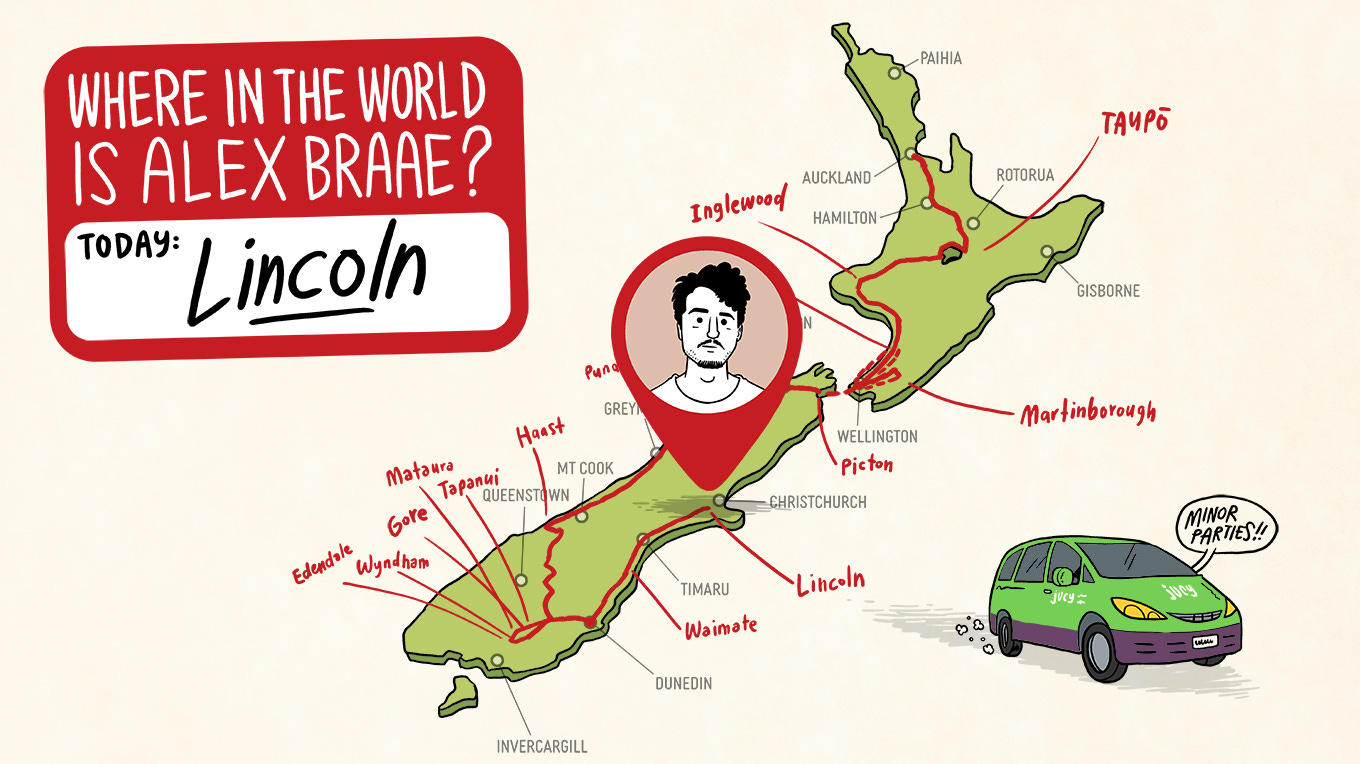For and against a four year term
The idea is gaining traction after agreement in the leaders' debate

Good morning and welcome to The Bulletin for Friday 2 October, by Alex Braae for The Spinoff. Presented in partnership with Z Energy.
In today’s edition: For and against a four year term, Labour planning market studies on groceries and building supplies, and NIMBYs fighting youth hub in Christchurch.

One of the major newslines out of Wednesday's leaders' debate was on a point of agreement between Ardern and Collins. During the quickfire question round, both were asked if they supported moving to a four year parliamentary term, as opposed to the existing three years. And both agreed that we should. So how does the idea stack up?
The case in favour was put succinctly in a NZ Herald editorial in 2018 – in brief, the argument is that governments could get more actual governing done if they didn't have to spend a third of every term effectively in election mode. They also noted that it tends to come from within the political system more often than not, which is probably a reflection on the reality of governing. Local governments are also seeking to change the length of their electoral cycles, on the grounds that the increasing complexity of the challenges they're being asked to take on requires more time. And in both cases, the underlying message is clear – governments are elected to govern, so they should be given ample room to get on with it.
But is that necessarily the best outcome for democracy as a system? As Stuff's Henry Cooke argues, governments (and particularly the executive branch of governments) are already incredibly powerful in New Zealand, relative to other democracies we compare ourselves against. He also argues that because of this power, governments could actually accomplish plenty over three years if they really set their mind to it – it's not for nothing that New Zealand is sometimes described as the "fastest legislature in the West." And for those on the outside of the political system looking in, there would be fewer opportunities to make their case to voters. Social Credit put out a press release after the debate saying that it would amount to a two-party power grab if Labour and National went ahead with it.
Having said that, Judith Collins tempered her enthusiasm by saying it would have to be decided by a referendum. New Zealanders have done that twice before, most recently in 1990 when the proposal was thoroughly rejected. It might be worth noting the context of the time – the country had just seen six years of the Rogernomics revolution, in which the government pushed through profound and rapid social and economic changes. Under MMP (rather than the old First Past the Post) those sorts of rapid transformations are more difficult for governments to achieve, but that's partly because we've always had multi-party governments since 1996. Coalitions aren't by any means assured under MMP – but with a three year term, regular elections for people to decide if they want change or more of the same are.
Labour is planning more Commerce Commission market studies if they get elected, into food prices and the cost of construction, reports Stuff's Thomas Coughlan and Luke Malpass. A market study is basically about assessing whether the markets are competitive enough to deliver fair prices for consumers – earlier in the term a fuel market study declared major petrol retailers were not behaving as competitively as they could be. The idea behind the new targets is that groceries make up a large share of many household budgets, and that building material costs can be up to a 5th of the cost of new residential houses in Auckland.
Local residents are fighting against a youth hub in Christchurch, that aims to provide "desperately needed" health and social services. Tina Law from The Press reports that the local NIMBYs (that's not pejorative, they literally don't want it in their backyard) are concerned about increased noise, lack of security and privacy, and a drop in property values. The Christchurch Methodist Mission would manage the facility, and no drugs or alcohol would be allowed on site. It would also give at-risk young people a place to go if they otherwise might become homeless.
Two stories on the cannabis referendum with perspectives you may not have heard: Radio NZ's Sela Jane Hopwood has reported on the varied views within the Pasifika community, with the impact on racism in the justice system being a particularly contested point. Community worker and legalisation opponent Ronji Tanielu also made the point that broken systems around alcohol and pokie machines in South Auckland made him fear what the impacts of legal access to cannabis would be. Also on Radio NZ, iwi Ngāti Kahungunu has thrown their support behind legalisation, saying they're also looking into setting up a medicinal marijuana project.
Meanwhile, the NZ Herald's (paywalled) Derek Cheng has reported on the impact of changes made to general drug laws a year ago. There has been a drop in prosecutions against drug users, with an increase in warnings instead. However, the figures show racial bias against Māori remains deeply embedded, particularly when it comes to policing cannabis.
More good analysis on the two-tier economic recovery we're seeing. Interest's Jenée Tibshraeny has compared the support being given to property owners, through the Reserve Bank pushing interest rates down, and those who don't, which is harder to estimate with any accuracy. But there's an important point in there about how interest rates are likely to be low for a long while, compared to a lot of income support which is temporary.
Mediaworks has won a court battle with Advance NZ over inclusion in their minor party debate. Newshub reports that the decision was made because the party "has not persuaded me that there is a prima facie case that the criterion applied by MediaWorks is unreasonable or arbitrary" – me in that quote being Justice Walker of the High Court. The debate has been filmed and will play tomorrow morning at 9.25am on Three.

(Image: Toby Morris)
Where in the world am I? Currently Christchurch, making the most of some pleasant sunshine and good Greek food, which is a lovely surprise about this city. The most recent piece from this trip took me to Lincoln University, a school with a large contingent of agriculture students, who filled a common room to see the Selwyn candidates pitch for their votes. My report was about one of those candidates in particular – National's Nicola Grigg – who is basically certain to win, and could well become an MP with the opportunity to have a very long stretch in parliament.
Got some feedback about The Bulletin, or anything in the news?
Drop us a line at thebulletin@thespinoff.co.nz

Right now on The Spinoff: Michael Andrew has a remarkable story about the Elliot Stables tenants fighting for survival against their landlord. Sherry Zhang writes about the Mid-Autumn festival, and gives some tips for making mooncakes. Tara Ward speaks to the creators of Zealandia, a sci-fi about a global pandemic that closes the borders which was created long before Covid. Ben Fahy writes about an increase in flexibility in working arrangements. Emily Writes speaks to breast cancer survivor Sarah Gandy about the importance of keeping on top of health checks. The 100 Year Forecast looks at what climate change will mean for animals in New Zealand. Property investor lobbyist Andrew King offers a defence of residential property investors. And Gone By Lunchtime is joined by special guest Mihingarangi Forbes, who – just saying here – would be a great host of a leaders' debate.
For a feature today, another strong piece from The Atlantic in their coverage of the pandemic. Science writer Zeynep Tufekci has looked at the k-rate – to absolutely simplify it down, that is around the creation and impact of clusters. As she writes, that can be considered a more useful and nuanced figure for understanding the spread. Here's an excerpt, around the more commonly used reproduction (r) rate of the virus.
Unfortunately, averages aren’t always useful for understanding the distribution of a phenomenon, especially if it has widely varying behavior. If Amazon’s CEO, Jeff Bezos, walks into a bar with 100 regular people in it, the average wealth in that bar suddenly exceeds $1 billion dollars. If I also walk into that bar, not much will change. Clearly, the average is not that useful a number to understand the distribution of wealth in that bar, or how to change it. Sometimes, the mean is not the message.
Meanwhile, if the bar has a person infected with COVID-19, and if it is also poorly ventilated and loud, causing people to speak loudly at close range, almost everyone in the room could potentially be infected—a pattern that’s been observed many times since the pandemic begin, and that is similarly not captured by R. That’s where the dispersion comes in.
A whole lot of to-ing and fro-ing over new Super Rugby teams has basically come to nothing, with plans being revealed this morning for the same 5-team Aotearoa competition to return next year. The NZ Herald's Liam Napier reports that the 2021 competition will be run as the same home and away league, with the addition of a one-off final. In 2022 things could end up a bit different, with expressions of interest from Pacific consortiums, the Western Force in Australia, and a South China team that would be based in the Bay of Plenty.
That's it for The Bulletin. If you want to support the work we do at The Spinoff, please check out our membership programme




